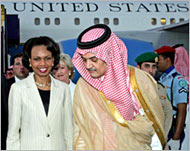Saudi reformers’ sentences upheld
A Saudi court has upheld jail terms of six to nine years for three prominent campaigners who called for political reforms in the absolute monarchy.

Ali Ghothami, their campaigners’ lawyer, said on Sunday he was told by a Riyadh judge the court had rejected appeals by the three men – two university lecturers and a poet – against the sentences passed in May.
The cases of Matruk al-Falih, Abd Allah al-Hamad and Ali al-Dumaini, who had petitioned for Saudi Arabia to move towards a constitutional monarchy, have highlighted the limits of the conservative kingdom’s modest reform programme.
Saudi Arabia held partial, men-only local elections this year. But supporters of the three reformists say their treatment shows the royal family will not tolerate any questioning of its power.
“These sentences are unfair and have no legal basis,” said a statement issued in the name of reformers calling themselves “supporters of the constitution and civil society”. It urged Saudi Arabia’s rulers to intervene and free the men.
US criticism
The three were arrested in March 2004, along with nine others who later were released. In their protracted trial, two of the three refused to defend themselves in protest at the hearings taking place behind closed doors.
 |
|
Rice described the campaigners |
Their arrest and sentencing drew rare public criticism from the United States, which has pushed for reform in ally Saudi Arabia since the 11 September 2001 attacks.
US Secretary of State Condoleezza Rice described the campaigners as brave citizens demanding accountable government in the world’s biggest oil exporter. On a tour of the Middle East, which included Saudi Arabia, last month she said their actions “should not be a crime in any country”.
Saudi Arabia said the case was a matter for the courts and that it would not accept changes imposed from outside.
Call for reform
During sentencing in May, judges said the men’s call for reform had incited people at a critical time in Saudi Arabia’s history when “its enemies are lurking and looking for excuses to intervene in the name of reform”.
In their appeal, the men said the case against them was riddled with judicial violations, including disagreement over which courts could try them, and a lack of impartiality by the panel of three judges which sentenced them.
Judges allowed prosecutors to introduce evidence that was not related to the initial charges, according to the appeal. After one public court session in August, the remaining sessions were held behind closed doors.